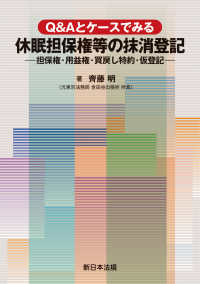基本説明
Examines and evaluates different ways which have been used to support students learning in classrooms, using mathematics and science as a model to examine how different stypes of interactions contribute to students' participation in classroom activity, and their understanding of concepts and their practical applications.
Full Description
Classrooms provide extremely varied settings in which learning may take place, including teacher-led conversations, small group unguided discussions, individual problem solving or computer supported collaborative learning (CSCL).
Transformation of Knowledge through Classroom Interaction examines and evaluates different ways which have been used to support students learning in classrooms, using mathematics and science as a model to examine how different types of interactions contribute to students' participation in classroom activity, and their understanding of concepts and their practical applications. The contributions in this book offer rich descriptions and ways of understanding how learning occurs in both traditional and non-traditional settings. Combining theoretical perspectives with practical applications, the book includes discussions of:
the roles of dialogue and argumentation in constructing knowledge
the role of guidance in constructing knowledge
abstracting processes in mathematics and science classrooms
the effect of environment, media and technology on learning processes
methodologies for tracing transformation of knowledge in classroom interaction.
Bringing together a broad range of contributions from leading international researchers, this book makes an important contribution to the field of classroom learning, and will appeal to all those engaged in academic research in education.
Contents
Introduction Part 1: Construction of knowledge in classroom interaction 1.1: The nested epistemic actions model for abstraction in context 1.2: The construction of physics knowledge in the classroom from different perspectives: the classroom as a community and the students as individuals 1.3: Technology-based algebra learning: epistemological discontinuities and curricular implications 1.4: Toward a trialogical approach to learning 1.5: Commentary on the chapters on the construction of knowledge Part 2: The role of the teacher in the transformation of knowledge in classroom interaction 2.1: Expert support for group work in elementary science: the role of consensus 2.2: Guidance in construction of knowledge: the troika of talk, tasks, and tools 2.3: Implementing technology-facilitated collaboration and awareness in the classroom - roles for teachers, educational researchers and technology experts Part 3: The role of argumentation and dialogue in transformation of knowledge 3.1: intersubjective and intrasubjective rationalities in pedagogical debates: realising what one thinks 3.2: Transformation of robust misconceptions through peer argumentation 3.3: Commentary of the chapters by Baker and Asterhan & Schwarz through the lenses of commognition 3.4: A dialogue on dialogue and its place within education Part 4: Methodologies for studying transformation of knowledge in classroom interaction 4.1: A methodological framework and empirical techniques for studying the travel of ideas in classroom communities 4.2: A design research perspective on the identities that students are developing in mathematics classrooms 4.3: Methodological considerations for the study of intersubjectivitity among participants of a dialogic mathematics classroom 4.4: Comparing and Contrasting Methodologies: a commentary Part 5: General reflections on transformation of knowledge in classroom interaction 5.1: Contour lines between a model as a theoretical framework and the same model as methodological tool 5.2: Learning in schools: a dialectical materialistic, cultural-istorical activity theoretic perspective 5.3: Sociogenesis and cognition: the struggle between social and cognitive activities






